Subscriber Benefit
As a subscriber you can listen to articles at work, in the car, or while you work out. Subscribe Now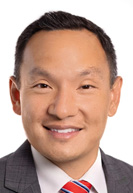
For Nicholas Huang, the opportunity to speak at the National Asian Pacific American Bar Association’s annual convention is something he describes as a true honor.
“I have shared with others that this is akin to hosting the Super Bowl,” Huang, a partner in Frost Brown Todd’s Indianapolis office, said of the upcoming NAPABA convention, which will be held Nov. 9-12 in Indianapolis.
The convention is an annual gathering of Asian American, Native Hawaiian and Pacific Islander attorneys, judges, law professors and law students and features dozens of speakers and a full agenda of panel discussions and continuing legal education programs.
This year’s convention includes plenary luncheons entitled “Gender Equality and the Rights of Transgender Athletes” and “Discussion or Disruption: How Law Schools are Navigating Civility, Free Speech, and Debate Over Deeply Contentious Issues.”
Mia Yamamoto, an attorney and civil rights activist, is scheduled to deliver the convention’s gala keynote address.
Huang said he’s spoken at Indiana University Maurer School of Law and Notre Dame Law School about diversity, and he’s often invited to speak broadly about the topic. But this is his first time speaking at the NAPABA convention.
A member of the national association and one of the founding members of the Asian Pacific American Bar Association of Indiana, where he has served as past president, Huang said he hopes that by NAPABA holding its convention in Indianapolis, APABA-IN’s footprint will expand.
The Indiana group previously hosted the Central Regional Conference for attorneys in the NAPABA Central Region — a key factor in NAPABA identifying Indianapolis as a potential national convention site.
“This has been many years in the making,” Huang said.
Indiana ties
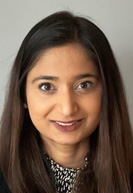
Rachana Fischer serves as an assistant United States attorney in the United States Attorney’s Office for the Southern District of Indiana, a position she assumed in February 2017.
Fischer will be a speaker on the convention’s “The Road to Authenticity: Diverse Perspectives on Navigating a Fulfilling Legal Career” panel. That panel will discuss the diverse perspectives and challenges facing AAPI attorneys and offer guidance on how to navigate the unique hurdles that different types of lawyers face in their careers.
Fischer, a Fort Wayne native, said being Asian and what it means to an individual fall under a large umbrella.
“There are a lot of different Asian identities,” she said.
The panel will feature different legal perspectives, including attorneys from government, in house, big law, and minority- and LGBTQ-owned firms. Convention organizers were looking for someone with a government service background to appear on the panel and reached out to her, Fischer said.
The goal, she said, is to draw attention to the balance between fitting in with an organization while also trying to find individual authenticity.
Fischer’s own practice has been diverse and includes working in private practice at a large law firm in Silicon Valley before spending the last almost seven years in the Indiana Southern District Attorney’s Office. Many of her law school classmates and colleagues have reached out to her about the convention.
“I’m excited to give them the grand tour of Indianapolis,” she said.
Fischer said she’s presented at CLE events before, but never at a convention of this scale.
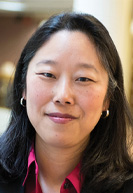
Susan Yoon, assistant dean of development at Indiana University Maurer School of Law, will also be a panelist. She’ll be part of the discussion called, “Be the Change You Want to See: Traditional & Non-traditional Opportunities for AAPI Legal Professionals to Engage AAPI Law Students.”
After graduating from IU Maurer in 1996, Yoon worked in tax consulting at Ernst & Young in Indianapolis prior to working in her current position at the law school.
Yoon said her panel is going to talk about how alumni can get involved with their law schools. She and other panelists will discuss the different paths that can be taken if an attorney wants to transition into academia.
On her own path, while she was working at Ernst & Young, Yoon said she started looking around at positions that would not require an additional degree. Funding and development was one of them, which ties into Yoon’s current position at the Bloomington law school.
There is an Asian Pacific American Law Student Association at IU Maurer, Yoon said, with between 20-30 law students as members. Law school officials have talked to the students about attending the convention.
“I think it’s a great opportunity for our students,” Yoon said.
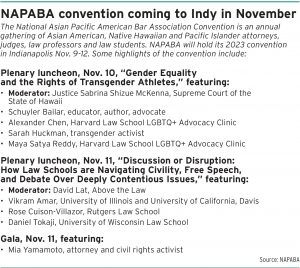 Indiana controversy
Indiana controversy
While Indianapolis will host the NAPABA convention in a matter of weeks, the Circle City almost lost the gig.
In December 2022, the NAPABA board announced the decision to remain in Indiana for its 2023 convention and released an open letter to its membership about that decision.
The letter discussed some members’ concerns about the state’s recent passage of legislation banning transgender girls from participation on girls’ school athletic teams and a law banning abortion, with certain exceptions.
“We recognize that some members will disagree with our decision to remain in Indianapolis, but we want everyone, including those who disagree, to help us display and model our values in Indianapolis, and support each other and impacted communities in the state,” the letter said. “NAPABA is working to ensure that the Convention itself can serve as a vehicle to highlight and take action on these issues.”
Then In September, the association released an Advocacy Action Plan, which included a four-pronged strategy designed to “meaningfully engage community stakeholders in Indiana and advance the dignity and interests of the LGBTQ+ and AANHPI communities in the time leading up to and beyond the Convention.” One prong of that plan, called “Showcasing Our Values,” pledged to “highlight issues such as AANHPIs and the fight for marriage equality, a reflection on the civil rights movement, how our community can advance the cause for justice, #WhyWomenLeave, and more.”
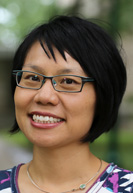
Sticking to that pledge, Ellen Wu, an Indiana University history professor specializing in the history of Asian Americans, will participate in panels called “Where We Fit In: Connecting the Dots Between AAPIs, the Civil Rights Movement, and Today” and “Situating Ourselves in the Civil Rights Movement: What They Didn’t Teach You in Law School.”
Wu said she is excited that an association centered around attorneys reached out to her and invited her to appear on one of their panels. She said it will be an interesting conversation to have different perspectives on Asian Americans working in coalitions with other groups.
Part of the conversation will touch on affirmative action, including the U.S. Supreme Court ruling this summer that removed race as a direct consideration for college admissions.
“For the most part of the history of affirmative action, Asian Americans have been active supporters of it,” Wu said.
She said she could understand why some NAPABA members would have reservations about holding their convention in Indiana. She acknowledged that Asian Americans like herself who live in “red” states and smaller communities can often get overlooked.
But as someone who is Asian American, lives and works in Indiana, and is involved with Asian American groups, Wu said she views the convention as a very exciting opportunity.
“It is just a really big deal for local communities,” she said.•
Please enable JavaScript to view this content.
